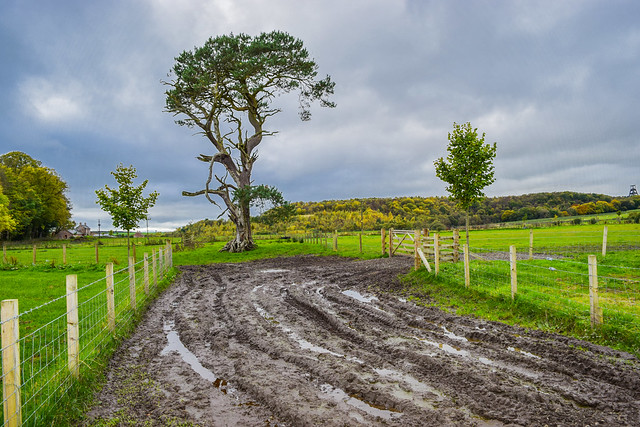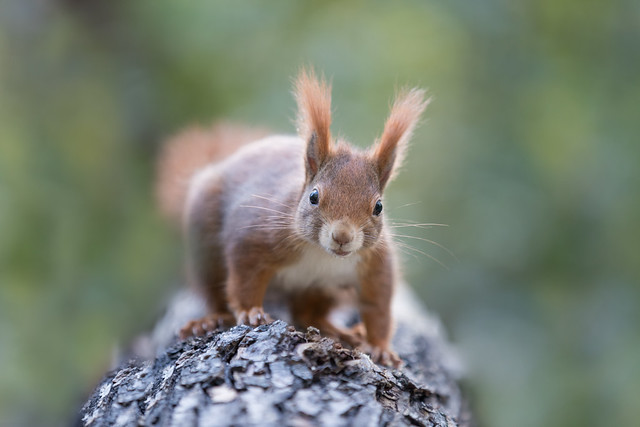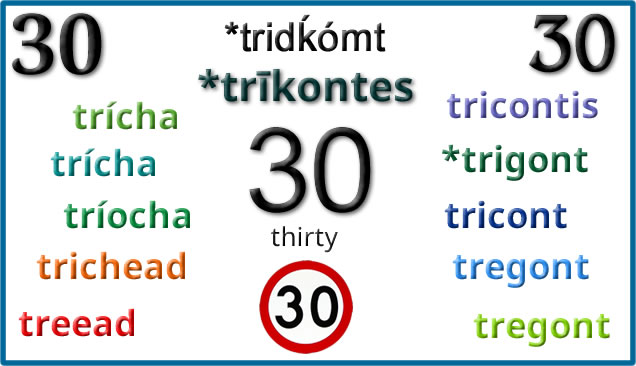Words for grain, corn and related things in Celtic languages.
Words marked with a * are reconstructions.
| Proto-Celtic | *grānom = grain |
|---|---|
| Old Irish (Goídelc) | grán [ɡraːn] = grain gráinne = grain, seed |
| Middle Irish (Gaoidhealg) | grán, gran = level surface, grain gráinne, grainne = a grain, a seed |
| Irish (Gaeilge) | grán [ɡɾˠɑːnˠ / ɡɾˠaːnˠ] = grain, ball, shot, pellet gráinne [ˈɡɾˠɑːn̠ʲə] = grain, (hard) particle, pinch (small quantity) gránach = cereal gránaigh = to granulate, scratch, scrape, graze gránlach = grain, grit, shot, pellets, granulated, ground, matter gránú = granulation gránúll = pomegranate |
| Scottish Gaelic (Gàidhlig) | gràn [graːn] = grain (cereal, wood), shot (of lead) gràinne [graː̪nʲə] = small grain, speck, small pellet, small quantity grànach [graːnəx] = grained, granular grànlach = corn, grain, cereal gràinneach [graːn̪ʲəx] = grained, granulous, granular, gritty, granulated gràinneanach [graːn̪ˠənəx] = pertaining to grains, grainy, granular |
| Manx (Gaelg) | grine = grain, corn, grapeshot, pellet, foresight grinaghey = grain grineagh = cereal, grained, granular grineeghey = to granulate, powder, granulation grinneegh = grained, grainy, granular, granulated, granulous, gritty |
| Proto-Brythonic | *grọn [ˈlɔːr] = grain |
| Middle Welsh (Kymraec) | graun, graỽnn, grawn = grain grawnwin, grawn-wîn = grapes, wine made from the juice of grapes gronyn, gronnyne, gronun = a single grain or pip |
| Welsh (Cymraeg) | grawn [ɡrau̯n] = grain, corn, cereal, seed, grapes, berries, fruit, roe, spawn (of fish), shot, grape-shot, load (of a gun) grawnafal = pomegranate grawndy, grawnfa = barn, granary grawnddwyn = grain-bearing, graniferous, bearing grapes or berries grawnen = grape grawnfwyd = cereal, grain-food grawnffrwyth = grapefruit grawnwin = grapes, wine made from the juice of grapes grawnwydd = vines gronyn = a single grain or pip |
| Old Cornish | gronen = grain |
| Middle Cornish (Cernewec) | gronen = grain |
| Cornish (Kernewek) | greun(en) [ɡɹøːn] = grain greunaval = pomegranate greunek, greunvos = cereal greunhe = to form grain greunji, greunva = granary, grange greunvosow = barley, cereals, corn, wheat greunya = to form grain in the ear |
| Middle Breton (Brezonec) | garan, greun(enn), grun = grain greunyaff = to go to seed, to grain, to seed, to spawn |
| Breton (Brezhoneg) | greun(enn) [ˈɡrœ̃ːn] = grain greunaval(enn) [grønɑ:val] = pommegranate greunek = grainy, granular greunenniñ = to granulate, to be granulated greuniañ = to go to seed, to grain, to seed, to spawn greunvaen [ˈɡʁœ̃nvɛn] = granite greunwin = raisins |
Etymology: from Proto-Indo-European *ǵr̥h₂nóm (grain), possibly from *ǵr̥h₂-nós (matured, grown old) from *ǵerh₂- (to grow old, to mature). Words from the same roots include grurë (wheat) in Albanian, corn and grain in English, Korn (kernel, cereal, corn, grain) in German, grano (wheat, corn, grain, peppercorn, money, pin) in Italian, zirnis (pea) in Latvian, зерно (zerno – grain, cereal, seed) in Russian and Ukrainian [source].
Gráinne in Irish, gràinne in Scottish Gaelic, and maybe grine in Manx, come from Old Irish gráinne, from Old French grain (grain), from Latin grānum (grain, seed, small kernel), from Proto-Italic *grānom (grain), from Proto-Indo-European *ǵr̥h₂nóm [source].
| Proto-Celtic | *arwar = grain |
|---|---|
| Old Irish (Goídelc) | arbar [ˈar.βər] = grain, corn |
| Middle Irish (Gaoidhealg) | arbar, arbor = grain, corn |
| Irish (Gaeilge) | arbhar [ˈaɾˠ(ə)wəɾˠ / əˈɾˠuːɾˠ] = corn, cereals |
| Scottish Gaelic (Gàidhlig) | arbhar [aravər] = corn |
| Manx (Gaelg) | arroo = corn, grain |
| Middle Welsh (Kymraec) | erwein(t) = meadow-sweet |
| Welsh (Cymraeg) | erwain(t) = meadow-sweet, Queen of the meadows |
Etymology: from Proto-Indo-European *h₂érh₃-wr̥/*h₂r̥h₃-wén-s, from *h₂erh₃- (to plough) [source]. Words from the same roots include aratro (plough) in Albanian, arado (plough) in Spanish, aradr (plough) in Welsh, erv (ridge between furrows) in Breton, and arti (to plough) in Lithuanian [source].
Sources: Wiktionary, Etymological Dictionary Of Proto Celtic, In Dúil Bélrai English – Old Irish glossary, eDIL – Electronic Dictionary of the Irish Language, Teanglann.ie, Am Faclair Beag, An etymological dictionary of the Gaelic language, Fockleyreen: Manx – English Dictionary, Online Manx Dictionary, Gaelg Corpus, Geiriadur Prifysgol Cymru, Lexicon cornu-britannicum : a dictionary of the ancient Celtic language of Cornwall, Gerlyver Kernewek, Devri : Le dictionaire diachronique du breton, Geriafurch, TermOfis











